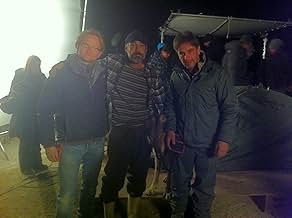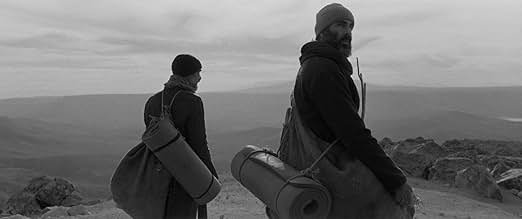IMDb RATING
6.1/10
1.7K
YOUR RATING
Post-apocalyptic world divided between city remnants and agricultural zones, both ruled by corporations and elites. Survivors navigate stratified society after an unspecified cataclysmic eve... Read allPost-apocalyptic world divided between city remnants and agricultural zones, both ruled by corporations and elites. Survivors navigate stratified society after an unspecified cataclysmic event, inspired by a chapter from the Noble Quran.Post-apocalyptic world divided between city remnants and agricultural zones, both ruled by corporations and elites. Survivors navigate stratified society after an unspecified cataclysmic event, inspired by a chapter from the Noble Quran.
- Awards
- 7 wins & 5 nominations total
Grigory Dobrygin
- Andrei
- (as Grigoriy Dobrygin)
- Director
- Writer
- All cast & crew
- Production, box office & more at IMDbPro
Featured reviews
Tried to do a Sufi based movie but not able because i believe it looks ilke a good show for the eyes. The essence was not sensable. Looks ilke memorizing sentences from Sufi-Islamic literature with good camera.
I'm sorry but this movie was a complete waste of time, why 2 stars and not 1 because the actors were still quite decent.
This movie goes from one fallacy to the next, irrational and uncohesive for the most part. Clearly had some propaganda in it for the Islam as it had a decent amount of quoted lines from the Qur'an and some clearly Islamic habits.
The only thinking it got me to do was what next stupid thing is the producer going to bring out next and what is his next flaw going to be.
It's clear the writer and producer where the same person and it was just a terrible move.
Let me do some guessing, I FEEL like that the producer was trying to produce a masterpiece like other great philosophers have done, such as Plato and his Plato's Cave, however he failed completely miserably. Probably due to not enough skills in being a philosopher, writer and/or director. It's a shame because the plot/synopsis looked very promising.
Edit/addition: People, animals and everything living thing does things with a reason. Sure people might hallucinate or dream. However why would anyone want to watch a random dream that's not cohesive at all.
Also gray-scale makes it look more apocalyptic, however if you need to use gray-scale to achieve such effects than you did a horrible elsewhere, such as in the scenery/decor or costumes. Talking is also kept to a minimum with dialogue that is either uninteresting or doesn't have much of a point (or both). It's basically watching an old movie with a bit of sound added. The difference, old movies did a good job conveying their plot and having a (interesting) plot. Again the movie does NOT at all show what is written in the synopsis. Again I suspect one (or a bit of both) of the following issues. Director/writer either thinks to highly of his work (or himself) and feels like he's spreading knowledge, like a Plato, Socrates, Aristoteles, etc. Or the director/writer/etc just took on too much work for 1 person.
Btw plot/synopsis, last time I read it doesn't describe the movie well.
This movie goes from one fallacy to the next, irrational and uncohesive for the most part. Clearly had some propaganda in it for the Islam as it had a decent amount of quoted lines from the Qur'an and some clearly Islamic habits.
The only thinking it got me to do was what next stupid thing is the producer going to bring out next and what is his next flaw going to be.
It's clear the writer and producer where the same person and it was just a terrible move.
Let me do some guessing, I FEEL like that the producer was trying to produce a masterpiece like other great philosophers have done, such as Plato and his Plato's Cave, however he failed completely miserably. Probably due to not enough skills in being a philosopher, writer and/or director. It's a shame because the plot/synopsis looked very promising.
Edit/addition: People, animals and everything living thing does things with a reason. Sure people might hallucinate or dream. However why would anyone want to watch a random dream that's not cohesive at all.
Also gray-scale makes it look more apocalyptic, however if you need to use gray-scale to achieve such effects than you did a horrible elsewhere, such as in the scenery/decor or costumes. Talking is also kept to a minimum with dialogue that is either uninteresting or doesn't have much of a point (or both). It's basically watching an old movie with a bit of sound added. The difference, old movies did a good job conveying their plot and having a (interesting) plot. Again the movie does NOT at all show what is written in the synopsis. Again I suspect one (or a bit of both) of the following issues. Director/writer either thinks to highly of his work (or himself) and feels like he's spreading knowledge, like a Plato, Socrates, Aristoteles, etc. Or the director/writer/etc just took on too much work for 1 person.
Btw plot/synopsis, last time I read it doesn't describe the movie well.
To some extent, GRAIN is a messy film of two halves. The first takes place in a futuristic factory where everything is manufactured, even the air. The Professor (Jean-Marc Barr) discovers that the person who can enlighten him the most (Ermin Bravo) has gone AWOL into the wilderness, and cannot be contacted. The Professor goes after him, with the help of youngster Andrei (Grigory Dobrygin), and guide Alice /Cristina Fluter). This covers roughly the first hour of the film, making trenchant points about the ways in which humanity has conspired to ruin the soil and the atmosphere, to such an extent that most of its is now synthetic.
The second half of the time, set in the wilderness, has the Professor encountering his missing colleague, but discovering a more important lesson about the relationship between humanity and the soil. The colleague takes him on a tour of the wilderness, and into his private lair, where some soil unaffected by the prevailing acid rain is preserved. The colleague resolves to take it out and use it for growing new natural things. Meanwhile the Professor discovers things about himself through dreams such as witnessing a burning bush, and being taken to a small area of land where the soil yields fresh produce. The movie ends with a pretty explicit exhortation to everyone - including the professor - to avoid complacency and contribute towards restoring the relationship between humanity and the soil by digging deep and discovering new soil and new plants, especially the wheat plant, which contains within its seeds the entire relationship between the soil and humanity.
There are distinct echoes of Kaplanoğlu's earlier meditations on similar subjects in the familiar trilogy (MILK, HONEY, EGG) but here the message is more insistently expressed through dialogue between the Professor and his colleague, plus a final image of the Professor discovering wheat seeds in a fertile piece of land in the wilderness.
The film's style is characteristic Kaplanoğlu, a slowly burning narrative with long silent patches, where all we can hear are the birds or the rustle of the characters moving around. We are invited to focus on the land - or lack of it in the first half - and how humanity has destroyed it with buildings now in a state of disrepair. This strategy makes the ending all the more powerful, as the Professor moves out of his hidey-hole on to the land, draws a circular shape (containing the fertile area) and digs out some wheat seeds.
As usual, some filmgoers might be bored with the slow style and occasional clunky lines, but there's no doubting Kaplanoğlu's sense of ideological purpose, which comes fully to the fore as the narrative develops. Definitely a film to watch again for its subtleties, although perhaps viewers have to know something about the Qu'ran to appreciate it fully.
The second half of the time, set in the wilderness, has the Professor encountering his missing colleague, but discovering a more important lesson about the relationship between humanity and the soil. The colleague takes him on a tour of the wilderness, and into his private lair, where some soil unaffected by the prevailing acid rain is preserved. The colleague resolves to take it out and use it for growing new natural things. Meanwhile the Professor discovers things about himself through dreams such as witnessing a burning bush, and being taken to a small area of land where the soil yields fresh produce. The movie ends with a pretty explicit exhortation to everyone - including the professor - to avoid complacency and contribute towards restoring the relationship between humanity and the soil by digging deep and discovering new soil and new plants, especially the wheat plant, which contains within its seeds the entire relationship between the soil and humanity.
There are distinct echoes of Kaplanoğlu's earlier meditations on similar subjects in the familiar trilogy (MILK, HONEY, EGG) but here the message is more insistently expressed through dialogue between the Professor and his colleague, plus a final image of the Professor discovering wheat seeds in a fertile piece of land in the wilderness.
The film's style is characteristic Kaplanoğlu, a slowly burning narrative with long silent patches, where all we can hear are the birds or the rustle of the characters moving around. We are invited to focus on the land - or lack of it in the first half - and how humanity has destroyed it with buildings now in a state of disrepair. This strategy makes the ending all the more powerful, as the Professor moves out of his hidey-hole on to the land, draws a circular shape (containing the fertile area) and digs out some wheat seeds.
As usual, some filmgoers might be bored with the slow style and occasional clunky lines, but there's no doubting Kaplanoğlu's sense of ideological purpose, which comes fully to the fore as the narrative develops. Definitely a film to watch again for its subtleties, although perhaps viewers have to know something about the Qu'ran to appreciate it fully.
To define it as a remarkable film, many reasons can be used. The most important is the state of soul after its final credits. A film about life and fundamental options. A film about faith and about goodness. About questions and about the high price of answers. A film about the return and the way and the bag of grains , a burning tree reminding the meet between God and Moses, the voice of child in night and his invitation to dinner and, not the last, the powerful memories about "Stalker" by Andrei Tarkovski. Sure, I admit, the temptation , before see the movie, is the names of Semih Kapanoglu and Jean- Marc Bar . i do not know if it is a masterpiece. But , for me, it is not far by this definition. So, only "Bugday".
I love this film with all my heart. Much better than expected.. Good acting and good camera.. The only real question is how many awards will this win. See this film, it's utterly incredible. you'll see how much better it becomes. The technical side of the movie is practically flawless.It was a good movie!
Did you know
- How long is Grain?Powered by Alexa
Details
Box office
- Gross worldwide
- $74,017
- Runtime
- 2h 8m(128 min)
- Color
- Aspect ratio
- 2.35 : 1
Contribute to this page
Suggest an edit or add missing content
































